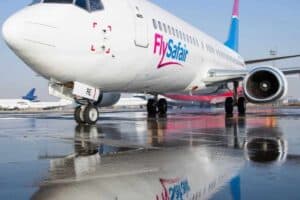His book, Crash and Burn, a CEO’s Crazy Adventures in the South African Airline Industry, is a chronicle that probably plays itself out in many industries – but few are as sexy as the airline game.

He has huge kahunas. Airline executive Glen Orsmond has been through some of the worst times in SA aviation and when the going got tough, several times over, he just kept going. A large part of his newly released book documents his on-off affair with Comair, once an iconic and globally respected airline.
Orsmond presided over Comair’s tanking, vicious protests with placards demanding his departure, survived boardroom duels to the death, duplicity on a Shakespearian scale and egos the size of the Empire State building. And most of that was at the purportedly squeaky-clean example of successful privateering, Comair.
Comair was a 75-year-old company, globally admired with 74 years of consecutive profits, says Orsmond. “The story needs to be told about what made Comair great and what caused its sudden collapse,” he says. “My 30-year career has been closely intertwined with Comair through three stints working there and twice competing against Comair – giving me insight into the Comair story.”
‘Crash and Burn’: Insightful airline adventures
His book, Crash and Burn, a CEO’s Crazy Adventures in the South African Airline Industry, is a chronicle that probably plays itself out in many industries – but few are as sexy as the airline game. “The book is not about me nor is it a business strategy or leadership book. I simply provide my insights gained through my interactions with Comair,” he adds. And it is a common thread throughout the book.
Comair projected a moral high ground, but it was a myth, according to Orsmond. “Businesses need to be profitable to survive without compromising ethics, calling Comair saintly might not be the right word,” he says. The book reveals many shenanigans.
It is an easy read, but it’s gripping stuff. Orsmond says the failures of a string of airlines over the past few decades like Sun Air, 1Time, Mango, and Comair were avoidable. “I talk about how business is ultimately about people, and I talk about the dominant people in the industry and also how personalities and rivalries often drive business decisions rather than sound business analysis techniques that get taught at universities,” he shares.
From Bop Air to 1Time
Orsmond starts his story with Bop Air, a homeland vanity project in the days of the Nationalist government. It then became Sun Air after which his multiple sorties at Comair had its genesis. After being overlooked at Comair, despite being told the top job was his, Orsmond quit to start 1Time. His approach with 1Time was unconventional.
“We started with a clean slate and could make up our own rules,” he says. He describes how staff were hired based on attitude first; he wanted to create a fresh culture from the ground up. And 1Time became a major market disrupter.
“We were profitable in seven of the eight years I ran it. We won the most customer service awards and we had the happiest, most motivated staff in the industry at the time,” he says. But it was a fairytale that did not last forever.
The end of 1Time was a significant blow to Orsmond, but not one he took personally. “I was disappointed that after successfully fighting Comair in the market for eight years, our fellow shareholders decided to remove the founders [Orsmond and Rodney James].
What followed was a disaster, increased costs and reduced revenue leading to its demise almost a-year-and-a-half after I left,” he says.
Comair boardroom battles: Orsmond’s account
The book interrogates the intense boardroom battles at Comair during his three tenures there and the rivalries that often overshadowed sound business strategies. Orsmond recounts his conflicts with his co-chief executive at the time, Wrenelle Stander, noting that their feud wasted valuable time that could have been spent addressing the looming crisis the company faced after Covid.
“We wasted 10 months engaged in squabbles instead of uniting and focusing on addressing the oncoming crash that was looming,” he admits.
Orsmond criticizes costly advisors in Comair’s rescue
Orsmond also criticizes the consultants, banks, and legal fees charged by ruthless attorneys during Comair’s business rescue process. “The fees were astronomical. I refer to these as the fingers in the honey jar in the book,” he says. The financial drain imposed by these external advisors contributed significantly to the challenges Comair faced during its business rescue period, he adds. 1Time rival Mango remains in a business rescue holding pattern.
“Mango was a great airline, an excellent brand, well-run and had good cash reserves until it was raided by SAA. Hopefully, someone will tell its story.” The critical impact of management decisions on the fate of airlines is again a theme that ultimately crashed Mango.
For Orsmond, aviation is an industry that’s hard to leave behind. It’s a common saying among people in the industry, that it gets into your blood. “You need to stick to what you know, and aviation offers many attractions and challenges. Ultimately though, aviation is no different to any other industry; it is an income statement problem that needs to be solved.”
Orsmond’s escape: Beach walks, classics, and Italy
When he’s not immersed in the complexities of the airline industry, Orsmond finds solace walking on the beach at his home in Chintsa on the Wild Coast. His love for the natural beauty and tranquility of this region provides a stark contrast to the high-pressure environment of aviation.
When he reads, Orsmond leans towards historical narratives and classic literature. Italy is his all-time favorite travel destination. “There is so much history, great food, lovely people and just enough chaos.” It’s almost like aviation.
Support Local Journalism
Add The Citizen as a Preferred Source on Google and follow us on Google News to see more of our trusted reporting in Google News and Top Stories.






